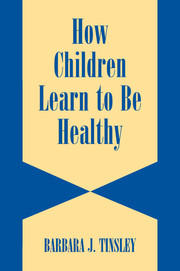Book contents
- Frontmatter
- Contents
- Acknowledgments
- How Children Learn to Be Healthy
- Introduction
- 1 Mechanisms and Consequences of Socializing Children to Be Healthy
- 2 Children's Health Understanding and Behavior
- 3 Parents' Health Beliefs
- 4 Parents' Promotion of Their Children's Health
- 5 Parents' Promotion of Their Children's Sexual Health
- 6 Peers, Schools, and Children's Health
- 7 How Television Viewing and Other Media Use Affect Children's Health
- 8 The Social Ecology of Children's Health Socialization
- 9 Summary and Conclusions
- References
- Index
6 - Peers, Schools, and Children's Health
Published online by Cambridge University Press: 27 July 2009
- Frontmatter
- Contents
- Acknowledgments
- How Children Learn to Be Healthy
- Introduction
- 1 Mechanisms and Consequences of Socializing Children to Be Healthy
- 2 Children's Health Understanding and Behavior
- 3 Parents' Health Beliefs
- 4 Parents' Promotion of Their Children's Health
- 5 Parents' Promotion of Their Children's Sexual Health
- 6 Peers, Schools, and Children's Health
- 7 How Television Viewing and Other Media Use Affect Children's Health
- 8 The Social Ecology of Children's Health Socialization
- 9 Summary and Conclusions
- References
- Index
Summary
A comprehensive picture of the ways in which children are socialized about health must include sources of influence beyond the family such as peers and schools. These influences have traditionally been viewed as important in early and middle childhood, when children begin formal schooling. However, in light of recent changes in maternal employment patterns and the early use of day care for a large percentage of infants and toddlers, these extrafamilial socializing agents are potentially influential from an early age. According to recent U.S. government estimates, only a quarter of infants and toddlers are cared for by their parents; the remainder are cared for by relatives or in a day-care home or center (Clarke-Stewart, 1993). Clearly, peers and other adults have many opportunities to influence the development of children's health attitudes and behaviors.
Peers as Influences on Children's Health
In spite of the many studies concerning the role of peers as models or reinforcing agents among young children (Bandura, 1989; Hartup, 1996; Newcomb, Bukowski, & Pattee, 1993), there is little research on the impact of peers on young children's health attitudes and behavior. For the most part, outcomes of peer socialization have been explored in the domains of cognitive development, school achievement, and personal and social adjustment. To date, with the exception of studies on adolescent antisocial health-related behaviors (e.g., substance use, sexuality), which we will address later, none of these peer socialization processes has been empirically studied in the context of children's health.
- Type
- Chapter
- Information
- How Children Learn to be Healthy , pp. 71 - 82Publisher: Cambridge University PressPrint publication year: 2002

